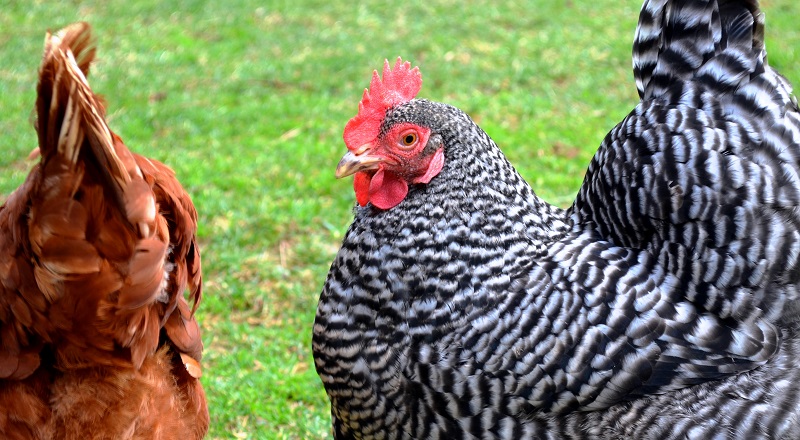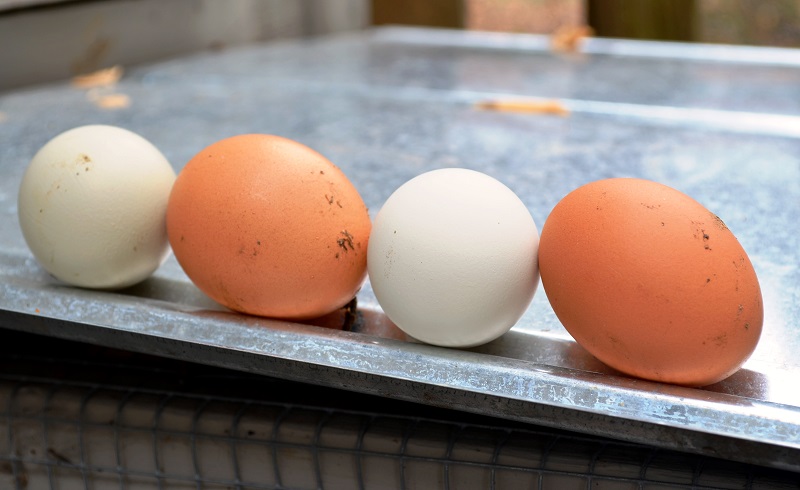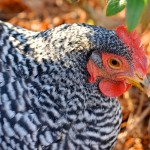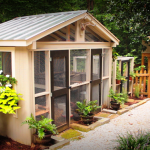Raising Backyard Chickens…Answering Your Questions
We really had a great response from last week’s post on the truth about raising backyard chickens…at least my truths. In addition to a good deal of traffic, we also got some good questions. I’ll answer some of them here. Please keep your questions coming…I’d love to provide you any insight that I can.
“What, if any, special accommodations did you need to make during our recent ice/snow storms?”
In a nutshell, it is not as much of an issue as you would think. The thing you need to watch out for is the low temps, not really the ice or snow…at least not with the amount of ice & snow we get here in Atlanta…even from Snowmaggedon 2014! The most important thing you have to watch out for is their water not freezing. Whenever it gets below freezing for an extended period of time you need to make sure that your chickens have fresh water (i.e., not frozen). You can either go back and forth throughout the day cracking the ice and/or refreshing their water…OR, if your coop has electricity, you can use water warmers to keep the water from freezing. And since our winters don’t get that cold that often, I just go back and forth on those few persistently cold days.
As far as the low temps and the chickens themselves keeping warm…that’s really a non-issue. Just consider the fact that little sparrows survive winters just fine. The critical thing here is that your chickens have been able to adapt to the colder temps as the days get colder. That’s why some say you shouldn’t use a heat lamp to keep your coop warm. Their thinking is that if something were to happen to the heat source (e.g., the electricity goes out), then you would be putting your chickens at risk…because their bodies had not had the time to adjust to the cold.
One other thing you need to do, especially in the colder areas of the country, is to watch out for their exposed skin…particularly those chicken breeds with larger combs. If it’s too windy and too cold for too long, they could get frostbite. There are a couple of things you can do to prevent this: 1. just like you would do to protect your lips, rub a little bit of Vaseline on their combs; and 2. make sure that your chickens have a place to get out of the wind. Again, since we don’t have very cold winters here, I haven’t concerned myself too much with this. However, because our coop is essentially open to the elements on one side with large windows on the other sides, just before we dipped into the single digits with stronger than normal winds earlier this year, Britt and I quickly fashioned curtains (almost like Roman shades) to keep the wind out.
This is not an exhaustive list of things you need to consider when “winterizing” your chickens, but these are probably two of the most important.
“Have you had any encounters with predators?”
This is another great question and one that I worried about quite a bit. I’d like to say that we haven’t had any problems with predators…but that’s not the case. However, the predators I worried most about have not been the predators we’ve had a problem with. We live between 2 streams and in front of a dried up pond…coyotes preferred means of getting around. Ever since we’ve lived here we’ve heard and seen quite a few coyotes. So when we got our chickens I was certain that we would have a pack of coyotes licking their chops every day just outside our fence. But that hasn’t been the case. Actually it seems we’ve seen and heard fewer coyotes. Not really certain why.
On the other hand we have had 1 incident with what we believe was a raccoon or feral cat…we didn’t see it, but assume it was a smaller varmint. About a year ago I started allowing my flock to free-range in our backyard whether I was home or not. One rainy day I was away from home for a few hours…and came home to a brutal scene. It looked like someone had gutted a feather pillow in front of the coop…4 of my 6 chickens were cowering in the corner of the coop…but the other 2 had been killed – one laying just outside the coop and the other wedged between the pickets of our fence. Their bodies were fully intact, but their heads had been eaten (sorry to be graphic…but that’s all part of having chickens…being ready to deal with and have discussions about life and death with your kids…a good thing I think). Anyway, we believe that they were killed by something smaller…otherwise all of the chickens would have been gone…heads, bodies and all. If it had been a hawk they would have flown away with them…not try to squeeze them between the fence, and would have gone after the fleshy parts of the chicken (not the head). Also, coons are known to eat chickens’ heads first. So it remains somewhat of a mystery, but the story I’m sticking with is that it was a raccoon or feral cat (just because I like to use the word “feral”).
 The lessons we learned…for us at least: 1. only let the chickens free-range when someone is at home and aware that they are outside; and 2. don’t let them free-range when it’s overcast/rainy. It is my belief that on overcast and rainy days, those smaller varmints are out and about more…AND with the sounds of the dripping rain the chickens’ awareness of what’s around them is hindered. I know I’m being really cautious with both of these “lessons”. Most chicken folk probably let their chickens free-range whenever. But this is how I’m trying to keep my flock safe.
The lessons we learned…for us at least: 1. only let the chickens free-range when someone is at home and aware that they are outside; and 2. don’t let them free-range when it’s overcast/rainy. It is my belief that on overcast and rainy days, those smaller varmints are out and about more…AND with the sounds of the dripping rain the chickens’ awareness of what’s around them is hindered. I know I’m being really cautious with both of these “lessons”. Most chicken folk probably let their chickens free-range whenever. But this is how I’m trying to keep my flock safe.
I have also noticed a few times that something small has tried to dig into the coop at night. But we constructed it and the run in such a way that nothing could get in. They are sunk about a foot into the ground with hardware cloth laid at that level with dirt on top of it so that nothing could dig under and then back up.
I’m certain we’ll have other run-ins with predators…so it’s important that we continue to keep a watchful eye on our little ladies.
“What’s up with washing your eggs…are you supposed to wash them or not? What about refrigerating them?”
Here’s another biology lesson for my family that didn’t come from a textbook. For those of you who have never retrieved an egg from a hen house, you may not realize…or may not want to think about the fact that…the egg is very likely not sitting there all shiny and clean. Very often there are pine shavings, feathers, and chicken manure stuck to the shell. So your natural tendency would be to wash them immediately. But don’t do it. If you do, you’re actually creating a greater potential health hazard.
So here’s your biology lesson…the outer shell of an egg is actually a semi-permeable membrane – which means that air and moisture can pass through its pores. So to protect the egg from bacteria and fine particles getting through the porous shell, as the egg passes through the hen’s “vent” (I’ll let you guess what that’s referring to), it gets a thin outer coating called a “bloom”. By washing your egg you are removing this protective coating; thereby increasing the chances of bacteria entering the egg. Which isn’t a good thing.
So what’s my personal practice: if the egg is at least relatively clean, I do nothing; if it has something stuck to it, I try to pick or flick it off; but if it is covered in manure, I do wash it in warm water (not cold water because that actually increases the chances of bacteria entering the shell even more).
Now this leads me to the question about refrigeration. Culturally we have become accustomed to refrigerating our eggs…we being from the US (not the case in other parts of the world, like Europe). This is because the USDA requires eggs to be power-washed before they can be sold in stores…which as we learned above, removes the protective bloom. Without the protective bloom the eggs need to be refrigerated, otherwise they would go bad quickly.
But if you don’t wash your eggs, you don’t wash off the bloom and your eggs can actually stay on your counter at room temperature for a couple of weeks…and some will even let them sit there for a couple of months. Not me. Maybe I will when I’ve been at this for awhile longer, but for now I would worry (illogically) that I would be poisoning my family or something. I know it’s not true, but I’m still brain-washed by our normal way of doing things. But know that you could.
Here’s my personal practice: I’m a belt and suspenders kind of guy. I don’t wash my eggs unless manure is caked on it. But I also refrigerate them. Sometimes I’ll leave them in a basket on the counter for the day because I think it looks cool. We’ve also looked into buying an egg skelter – this cool egg ramp deal that stores your eggs in chronological order. Maybe then we’ll leave them out longer.
So there you have it…the answers to 3 of the questions I’ve gotten from my last post on raising backyard chickens.
What other questions do you have on the ins-and-outs of raising chickens?
Take care,
You may also enjoy these posts from RYG ...
If you're not already subscribed to RYG and want to get periodic updates, links to new posts & other ground redeeming info ... just enter your email address below. Easy as that!








How do you clean (and how often) your coop? Do you use any antibacterial washes on the areas that get the most poo?
Hey Brian…thanks for your questions and so sorry to just be getting back to you…your comment got trapped on the backend of our blog for some reason. Please accept my apologies. To answer your question, I typically do a more significant cleaning every few months…where I scrape all the dried poo from the flat surfaces and remove all the pine shavings…and replace with new. In between I’ll fluff up the pine shavings w a pitch fork or rake…add new pine shavings if needed. Probably once per year I’ll scrub everything down w just a scrub brush and water (sometimes I’ll use white vinegar, but no soap of any sort…although I’m sure you could). After having the coop for about 2.5-3 years I did put a fresh coat of paint on some surfaces…and will probably do that again in the next few months.
Note, my coop is really wide open…so it gets a ton of fresh air wafting through it. So everything dries out pretty quickly…keeping the stink down. The only time it stinks (and never enough to smell it beyond 5′ away) is when it’s rained for a long time…but then after things dry out, the stank is gone again. During these wet/stinky times I’ll spread some DE around the coop and run…and that seems to do the trick.
The other consideration on how often you might need to clean is the concentration of chickens for the size of your coop. I typically have 6-8 and my coop is pretty big (7’ish by 12’ish).
I hope this helps…let me know if you have any other questions.
Take care, D.
When it rains does the coop floor get all wet with the front so open? Love your coop and am thinking about doing something similar on a smaller scale. Thanks
Hey Noelle…thanks for your question, and you’re not the first to ask it. Very little rain gets in when it rains. I believe that’s largely because our coop is within 15′ of the side of our house and the prevailing winds come from that direction, so our home blocks the wind and the rain pretty much falls straight down. However, when it really storms some rain gets in perhaps the first foot or so, but not much at all. That said, if I were to do it all over again, I would probably have put an 18″ kickwall of sorts in the front. Not really because of the rain…although it would help that, but because it would keep the pine shavings, etc. from getting OUT of the coop. Let me know if you have any other questions. Thanks again for reaching out…and good luck w your coop. Take care, D.